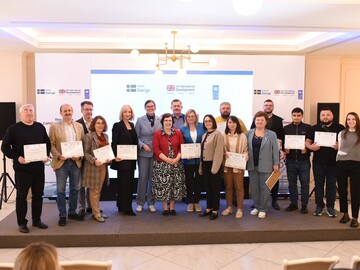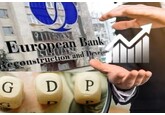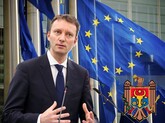
Sweden, the United Kingdom, and UNDP allocate $1.3 million to develop six economic clusters on both banks of the Dniester River
Specifically, six new economic clusters will receive financial assistance totaling approximately $1.3 million to accelerate their development and stimulate economic cooperation between communities on both banks. The assistance is being provided by Sweden and the United Kingdom through the UNDP project “Advanced Cross-river Capacities for Trade” (AdTrade). Each of the six clusters will receive grant funding of up to $275 thousand in the form of equipment, goods, and services. This assistance is aimed at strengthening production capacities, expanding value chains, improving product quality, and increasing competitiveness in local and international markets. Support also includes mentoring activities and training for cluster members aimed at process optimization, innovation, and job creation. Six beneficiary clusters were established in 2024 with support from UNDP, Sweden, and the UK under the AdTrade project. Each cluster has its own governing body and a three-year strategic development plan. Supported clusters: Moldova Textile Export, Nistrul de Jos, Riviera Nistrului, Fruit Export Hub, Gold Grapes Logistic, and Trade Honey Group. In particular, the Moldova Textile Export light industry cluster brings together 12 light industry factories and workshops in the micro-regions of Rezina, Ribnita, and Soldanesti. With the support of the AdTrade project, the cluster intends to support small light industry producers in the region in entering foreign markets by modernizing equipment and optimizing cooperation throughout the value chain. The Lower Dniester Vegetable Sector Cluster (Nistrul de Jos) brings together 12 economic agents traditionally specializing in vegetable production in the micro-region comprising the settlements of Stefan Voda, Slobozia, Bender, Grigoriopol and Causeni. The main focus is on improving product quality and post-harvest infrastructure for vegetable production in the region. The Dniester Riviera tourism cluster includes 17 economic agents from neighboring settlements of the Dubasari Reservoir, traditionally known as the “Moldovan Sea,” which is the largest body of water in Moldova. It promotes sustainable tourism, with a focus on recreation, ecotourism, and comprehensive visitor services. The assistance received will help to increase the competitiveness of the region's tourism offer. The Fruit Export Hub agri-food cluster brings together 13 economic agents from the micro-regions of Soldanesti and Camenca with an annual production of around 10 thousand tons of fruit. Investments will be made in post-harvest infrastructure, packaging, and promotion on international markets. The Gold Grapes Logistic table grape cluster includes 11 economic agents from the micro-regions of Stefan Voda, Causeni, Slobozia, and Grigoriopol. Support will be provided to improve product quality and create a modern logistics platform for the storage, sorting, and packaging of grapes with a view to expanding exports. The Trade Honey Group beekeeping cluster in the micro-regions of Causeni, Slobozia, Grigoriopol, and Basarabeasca includes 11 economic agents on both banks of the Dniester River, which manage a total of more than 3,500 bee colonies. The project aims to increase the added value of beekeeping products by modernizing honey collection, processing, and certification processes. Assistance to the clusters will help strengthen their capacity, as well as expand value chains, interregional cooperation, and economic integration of communities on both banks of the Dniester. As a result, 64 economic agents on both banks of the Dniester will increase their competitiveness, labor productivity, and export opportunities. Since 2019, UNDP Moldova and its partners—the European Union, Sweden, Switzerland, and the United Kingdom—have supported the formation and development of 17 clusters, investing $4.8 million. The sectors covered include livestock farming, horticulture, tourism, and industry. The clusters are designed to create greater added value for local economic growth and increase the competitiveness of small and medium-sized enterprises. // 15.05.2025 – InfoMarket.







